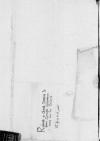Cum, paucis diebus elapsis, Reverende in Christo domine et amice dilecte, ex Livonia (Livland, Inflanty), estate of Livonian Order, today part of Latvia and Estonia⌊LivoniaLivonia (Livland, Inflanty), estate of Livonian Order, today part of Latvia and Estonia⌋ in Prussia, region in central Europe, bordered by Pomerania, Poland, Lithuania and Livonia. From 1466 Prussia was divided into Royal Prussia (Prussia Regalis), which was a part of the Kingdom of Poland, and Teutonic Prussia (Prussia Ordinis Theutonici) – covering the remnants of the former territory of the Teutonic Order’s state in Prussia. In 1525, the Order’s last Grand Master, Albrecht von Hohenzollern, converted to Lutheranism and became the first lay duke in former Teutonic Prussia (dux in Prussia), which from then on was called Ducal Prussia (Prussia Ducalis). At that time, as a result of the treaty of Cracow, Ducal Prussia became a fief of the kings of Poland⌊PrussiamPrussia, region in central Europe, bordered by Pomerania, Poland, Lithuania and Livonia. From 1466 Prussia was divided into Royal Prussia (Prussia Regalis), which was a part of the Kingdom of Poland, and Teutonic Prussia (Prussia Ordinis Theutonici) – covering the remnants of the former territory of the Teutonic Order’s state in Prussia. In 1525, the Order’s last Grand Master, Albrecht von Hohenzollern, converted to Lutheranism and became the first lay duke in former Teutonic Prussia (dux in Prussia), which from then on was called Ducal Prussia (Prussia Ducalis). At that time, as a result of the treaty of Cracow, Ducal Prussia became a fief of the kings of Poland⌋ causa invisendi illustrissimum principem dominum Albrecht of Brandenburg (Albrecht von Hohenzollern) (*1490 – †1545), 1499-1545 co-Margrave of Brandenburg (together with his brother Joachim I Nestor), 1513-1545 Archbishop of Magdeburg, 1514-1545 Elector and Archbishop of Mayence, 1518 elevated to cardinal; son of Johann Cicero, Prince-Elector of Brandenburg, and Margarete of Saxony (daughter of Wilhelm III von Sachsen)⌊Albertum marchionem BrandeburgensemAlbrecht of Brandenburg (Albrecht von Hohenzollern) (*1490 – †1545), 1499-1545 co-Margrave of Brandenburg (together with his brother Joachim I Nestor), 1513-1545 Archbishop of Magdeburg, 1514-1545 Elector and Archbishop of Mayence, 1518 elevated to cardinal; son of Johann Cicero, Prince-Elector of Brandenburg, and Margarete of Saxony (daughter of Wilhelm III von Sachsen)⌋, Prussiae et ducem et fratrem nostrum dilectissimum venissemus, exhibitae sunt nobis litterae reverendissimi domini Olaus Magnus (Olof Månsson, Olaus Magni) (*1490 – †1557), Swedish historian and geographer, brother and successor of Johannes archbishop of Uppsala⌊archiepiscopi UpsalensisOlaus Magnus (Olof Månsson, Olaus Magni) (*1490 – †1557), Swedish historian and geographer, brother and successor of Johannes archbishop of Uppsala⌋ ex Trent (Tridentum), city in northern Italy, Trentino-Alto Adige (Südtirol)⌊TridentiTrent (Tridentum), city in northern Italy, Trentino-Alto Adige (Südtirol)⌋ ad nos scriptae, quibus inter cetera significabatur se etiam vobis de rebus generalis concilii, quod nunc Tridenti celebrat quaedam scripsisse, ac inter cetera petiisse, ut nobis quoque descripta concilii decreta, quae ab illo accepistis, transmitteretis.
Sed quoniam iam in partibus vicinioribus nos esse evenit, quo minus necesse est in Livonia (Livland, Inflanty), estate of Livonian Order, today part of Latvia and Estonia⌊LivoniamLivonia (Livland, Inflanty), estate of Livonian Order, today part of Latvia and Estonia⌋ nobis vel nuntium vel epistolam mittere, petimus benigne, ut hoc nostro nuntio et ministro eadem concilii decreta, et si quid praeterea de progressu, statu, et rebus concilii certi apud vos est nobis communicare dignemini, nostra enim haec scire maxime referre puto. Nec enim commode dicto Olaus Magnus (Olof Månsson, Olaus Magni) (*1490 – †1557), Swedish historian and geographer, brother and successor of Johannes archbishop of Uppsala⌊domino archiepiscopoOlaus Magnus (Olof Månsson, Olaus Magni) (*1490 – †1557), Swedish historian and geographer, brother and successor of Johannes archbishop of Uppsala⌋ respondere poterimus, nisi de rebus his, quae sua demonstrat epistola, certiores simus facti ac instructi. Et quamvis nobis de facie, ut opinor, non estis undique notus, tamen litteris his maiori notitiae et familiaritati futurae occasionem dedisse opinor, quam etia paper damaged⌈[etia]etia paper damaged⌉m sincere exopto ac precor, ut nos pari modo vestra familiaritate dignare velitis. Si quid vobis gratificari possumus, non deerit in nobis officii quicquam.
Deo Optimo Maximo cum incolumitate longaeva et felici rerum gubernatione vos commendantes.


 UUB, H. 154, f. 149av
UUB, H. 154, f. 149av